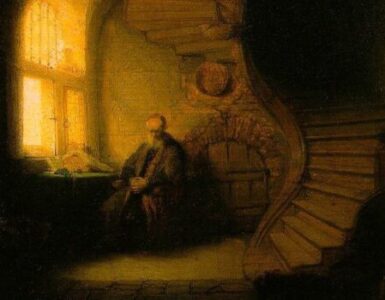The Pillar has been reporting on recent changes to diocesan policy in San Diego which no longer allows charter, private, or homeschool coops and families to utilize facilities at parishes within the diocese. They still allow “non-Catholic educational programs or schools” to rent spaces with the bishop’s approval. Cardinal Robert McElroy wants to focus on building up Catholic education and states that support for charter schools, private schools, or homeschooling “can undermine the stability of nearby Catholic schools.”
This has, whether intended or not, perpetuated the division growing between Catholic schools and homeschooling families. It also ignores the very real concerns many faithful Catholic families have when it comes to Catholic education, which has led many families to seek other options for their children. The poor spiritual state and astronomical cost of Catholic education in far too many dioceses has led families to homeschooling or to the creation of charter and private schools.
My husband and I have been in this situation ourselves where we have had to choose between homeschooling, Catholic schools, and classical Protestant schools. It has been a painful and difficult journey. While there may be some homeschooling families who are intentionally pitting themselves against Catholic schools in different dioceses, by-in-large most homeschooling families believe that they are being asked by God to homeschool, that the Catholic schools are too prohibitively expensive, or that the Catholic schools are problematic in themselves. The competition between these schooling options is often unjust, and homeschooling families’ very serious concerns are ignored or met with hostility.
My husband and I made the decision to homeschool early in our marriage for many of the reasons already stated. Our daughter took well to homeschooling when she was younger and raced through kindergarten and first grade. By second grade, my husband fell seriously ill, and we were confronted with the prospect of him possibly dying. Homeschooling became impossible during the three years we spent in and out of the hospital, trying to get his rare auto immune disease under control. Even though it would mean a financial burden, and although we’d been warned about issues in the school, we made the decision to enroll her in Catholic school.
We almost immediately regretted the decision, but there was little we could do with my husband so ill. Our daughter spent that year paralyzed by anxiety. She was being bullied by one of the girls in her class—as were other students—but nothing was done about it. Multiple children left the school over the issue. Our daughter learned very little about her Catholic faith, which was understandable because her teacher was not Catholic. Our concerns were ignored. We were paying for a secular education with weekly Mass attendance and bullying.
Unexpectantly, she had a much easier time in the public grade school she attended for third grade. She would have stayed there until middle school—after which we were planning to return to homeschooling—but the COVID-19 pandemic hit, and we were forced back into homeschooling, which was difficult for her as an only child. A lot of children found themselves in online schools or homeschooling for the first time.
After multiple years of homeschooling, the Lord asked us to move across the state for a year while I served in full-time ministry. Our daughter returned to Catholic school. We were hopeful that this new school would be an improvement. It was not. Our daughter came home to tell us that on a regular basis she was made fun of for being “too Catholic.” The kids were viciously mean to each other, and I watched our daughter morph into an abnormally mean-spirited pre-teen. (She’s not a saint yet and definitely has the teen attitude, but this was something else entirely.)
On multiple occasions, I had to write to the school about issues with kids, including the discussion on pornography my daughter was subjected to by the boys in her class, a fascination with the occult in multiple students, issues with the curriculum, incredibly violent conversations due to absent parenting that left kids to live on their electronic devices watching whatever they wanted, an overdependence on laptops for education which pitted parents against children in technology battles and fostered addiction in students, and other issues. The hardest part for her was the constant mockery of her Catholic faith in a school that claimed a Catholic identity. It became painfully clear to my husband and me that many Catholic schools are more interested in college enrollments than forming young people into disciples of Jesus Christ.
As parents, we will have to stand before the Lord and give account for our choices. He will ask us if we sought to lead our child to Him, or if we left her to the world. Parents in our situation take this call very seriously, at the same time understanding that we are sinners who fail on a regular basis. This is not because we think we are somehow superior, which is a common and baseless accusation. It’s because we know that we are the “primary educators” of our child and that this call comes with an incredible amount of responsibility.
One of the lies still permeating the Church in the West is the argument that we need to support and protect the institutional Church. This is true if the human institutional Church is fulfilling the supernatural dimension of the Church. We are under no obligation to support aspects of the human institutions if they are corrupted or if they’ve lost their Catholic identity. If anything, it is our obligation to point out when they have lost their way. This disordered loyalty to the human dimensions of the Church that have become corrupted is what gave us the clergy sex abuse coverups, as well as the destructive policies in its wake that have created a false idol out of liability at the expense of the salvation of souls.
Catholic schools that are not living their God-given mission of raising up disciples in Christ should fail. They need to fail because if they are not focused on Christ, then they are leading souls astray. If children from families who are devout in the practice of the Catholic faith are being openly mocked in Catholic schools, then why would those families want to financially strap themselves to a toxic environment for their children? Why would they want to lead their children into an environment that is spiritually and emotionally abusive? Why would they want to run the risk of watching their children lose their Catholic faith in a Catholic school because their child is alone among their peers?
Families who have very serious concerns about the state of Catholic education are often ignored or attacked. This is not about power, and unfortunately too many chanceries have turned everything into a power struggle. This is about the salvation of souls. It is about taking seriously our promise to raise our children Catholic.
One of the greatest sorrows I carry is the fact that I cannot currently give my daughter a rich, deep, and beautiful Catholic education. I never thought my husband and I would be faced with the decision to send our daughter to a hybrid (onsite/homeschool) classical Protestant school. I never thought I would teach at a classical Protestant school. Yet here we are. We finally had to abandon our hope of a Catholic school education after two disappointing experiences.
People often argue that we must help renew from the inside out. I completely agree; however, that opportunity has never been given to me, and it was not for lack of trying. I offered to serve within the system. Since I could not find a way in, we decided that we would rather she learn how to defend her faith against dedicated Protestants than be in a Catholic school where she is routinely mocked for her Catholic faith.
Like our family, I know many Catholic homeschoolers who would happily send their children to Catholic schools if the schools re-committed to their Catholic identity. My husband and I would try Catholic education again if serious changes took place. Unfortunately, our negative experiences are all too common, which is why more and more families are choosing homeschooling or other schooling options. The financial dimension is also a serious hurdle for large families, which influences homeschooling.
What do those changes towards Catholic identity look like that would make some of us return to Catholic education?
A strong Catholic school identity means teaching the Catholic faith across the curriculum as opposed to providing a secular education with a religious education class. The separation of the subjects from a Catholic worldview means that our schools are forming largely secular students. Classical schools understand that the Faith must be taught in every single class.
Homeschooling curricula already have these materials readily available that could easily be incorporated into Catholic schools. Catholic schools need to abandon the public-school model. Until they do so, Catholic schools will continue to be undermined by this predominately secular approach to education. The return of daily Mass, regular Adoration, liturgical living, and prayer in classrooms would also go a long way in renewing Catholic education.
At its heart, the division between homeschooling and Catholics schools reveals a very deep rift in understanding of what it means to be a disciple of Jesus Christ. Both sides mean well, but too many Catholic schools have completely lost their identity because they have adopted a public-school mentality. Too many Catholic schools are private schools that are focused on Ivy League acceptance rather than on helping students live their baptismal promises.
I have been on both sides of the homeschool versus Catholic school debate. The decisions that families make regarding the education of their children are deeply difficult. It is painful for a family to have to abandon Catholic school education because the Catholic schools are not living their identity and forming disciples.
Perhaps those who are involved in policy making decisions within dioceses should consider the very real concerns many Catholic families have about the state of the diocesan schools. Only then can there be any real change and movement of homeschooling families back into Catholic school education.
Photo by Anita Jankovic on Unsplash













